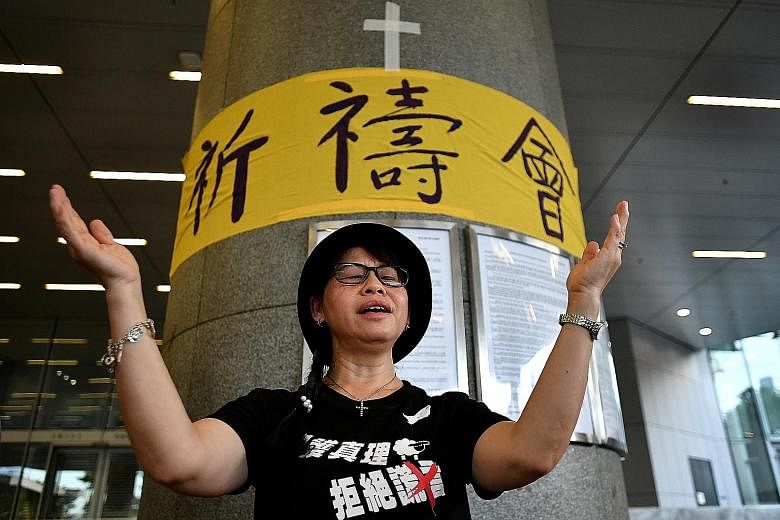It is a study in contrasts: one, the logo of Pepper Lunch, a popular Japanese restaurant chain; the other, captioned Pepper Lunch Hong Kong, showing the police pepper-spraying protesters on June 12 just after lunchtime.
This is just one instance of how Hong Kong's contentious extradition Bill has sparked a whole new genre of protest humour, from memes to wordplay to a song borrowed from a Christian hymn book.
The anti-Bill movement is referred to as "faan soong zhong", which literally translates to "anti-extradition to China". But in Cantonese, the city's lingua franca, "soong zhong" is a homophone for seeing someone off at a funeral.
Led mostly by young protesters adept at technology, memes skewering the city's leaders, the police and the Bill have mushroomed, leveraging on the colourful Cantonese dialect and its wordplay.
Much of these appear on the Reddit-like site, LIHKG, which was also one of the most popular forums for protesters to discuss strategies.
One popular meme has the faces of several Hong Kong leaders superimposed on a Lord Of The Rings movie poster with the phrase "push to you".
It is a reference to how the city's leaders have tried to shirk responsibility for mishandling the Bill, said Ms Cathy Kam, 37, a production designer.
"There's also a double meaning with (Hong Kong Chief Executive) Carrie Lam as Gollum, showing her with the ring and going mad with power."
There are also many variations of memes about "mothers" - a nod to a common Cantonese insult - after the embattled Mrs Lam, in an emotional interview, referred to herself as the mother of Hong Kong who is forced to discipline her child.
"Hong Kong culture has always been to respond to power with satire… which is why a lot of Stephen Chow's early movies have been based on this," said Assistant Professor Liew Kai Khiun, who researches popular culture at Nanyang Technological University.
"The sort of wordplay that you see in Cantonese, you don't see in Mandarin. It's a street language that is very irreverent and vernacular."
Professor Lian-Hee Wee, an expert in Cantonese phonology at Hong Kong Baptist University, said: "After the (1997) handover, the threat against Hong Kong's sense of freedom was enhanced by the institution of putonghua (Mandarin), so much so that Cantonese became a language of resistance."
Another difference is that Hong Kong has retained the use of traditional Chinese characters while simplified Chinese characters are used in China. As a result, Cantonese has come to represent everything about Hong Kong that is different from China.
Then there is the protest anthem.
During the "Occupy" movement or Umbrella Movement in 2014, a song by Hong Kong rock band Beyond, titled Boundless Ocean Vast Skies, became the unofficial anthem because of its defiant lyrics about freedom.
Another protest favourite was Do You Hear The People Sing? - from the musical Les Miserables.
This year, the protests over the extradition Bill have turned the hymn Sing Hallelujah To The Lord into a hit. Just those five words, sung four times, have been a constant earworm across protest sites in central Hong Kong. Pastors who came between young protesters and police on June 12 sang it in a bid to defuse tensions, and the hymn quickly caught on for its simple tune and lyrics.
Ultimately, humour is what Hong Kongers turn to in difficult situations, said Ms Kam. "I may not be able to change policies... but at the very least I can have a good laugh."










